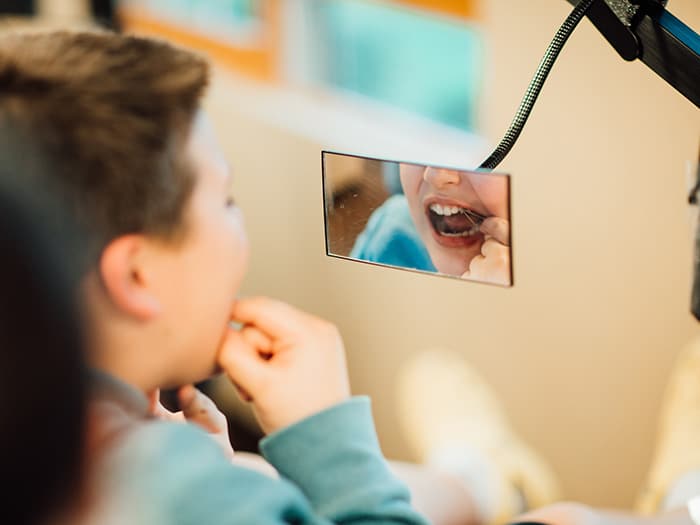When Should My Child First Visit the Orthodontist?
The American Association of Orthodontists recommends that children have their first orthodontic screening by age 7. Dr. Vincent Smith, Dr. Brian Kurtzner, and Dr. Greg Stock at SKS Orthodontics can assess a child’s teeth and jaw development to determine the right time for treatment. Many dentists can identify early orthodontic issues and may refer your child to our office even before they turn 7 if needed.
Why is an Early Evaluation So Important?
An early orthodontic evaluation can make a significant difference in your child’s oral health and development. Early diagnosis allows Dr. Smith, Dr. Kurtzner, and Dr. Stock to guide the eruption of teeth into better positions, preserve space for incoming permanent teeth, and reduce the risk of injury to protruding front teeth. It also helps in minimizing the complexity of future treatment. Key benefits include:
- Guiding jaw growth: Ensuring proper alignment of the incoming permanent teeth.
- Regulating dental arches: Creating space for permanent teeth and avoiding crowding.
- Preventing tooth extraction: Reducing the likelihood of needing extractions later.
- Correcting habits: Addressing thumb sucking and abnormal swallowing or speech issues.
- Simplifying future treatment: Reducing the complexity of treatment when all permanent teeth erupt.
Is Early Treatment Necessary for Every Child?
Not all children need early orthodontic treatment. In some cases, certain orthodontic issues can be more efficiently addressed once all the permanent teeth have emerged, typically during the teenage years. Some skeletal problems may also require treatment only when growth has progressed further. The orthodontists at SKS Orthodontics will develop a personalized treatment plan based on your child’s unique needs.
If early treatment is not required, your child may be placed in our orthodontic supervisory program. It’s still essential to have your child evaluated around age 7 to ensure the best timing for any necessary treatment.
What is the Orthodontic Supervisory Program?
The Orthodontic Supervisory Program is for children who may not need active treatment yet but require monitoring. It helps track the eruption of permanent teeth and address issues early, including the possible early removal of baby teeth to ensure proper alignment. This proactive approach can reduce the need for braces later. Key features include:
- Monitoring eruption patterns: Keeping track of permanent teeth development.
- Early intervention: Recommending early removal of baby teeth to aid eruption.
- Collaborative care: We’ll work with your family dentist to ensure comprehensive care.
- Regular checkups: Patients typically visit us every 6 to 8 months for evaluation.
There’s no fee for this program, and it’s an essential tool for determining the best time to begin orthodontic treatment.
What Other Benefits Come with Orthodontic Treatment?
Orthodontic treatment offers more than just a beautiful smile. Braces and other orthodontic appliances can improve the function of your bite, making it easier to chew and speak. They also enhance oral hygiene by aligning teeth, reducing the risk of tooth decay, and preventing uneven wear on teeth. Additional benefits include:
- Improved bite function: Corrects issues like overbites and underbites.
- Better oral hygiene: Makes it easier to clean your teeth effectively.
- Preventing tooth wear: Reduces unnecessary wear caused by misaligned teeth.
- Long-term dental health: Enhances the longevity of natural teeth over time.
Can Early Treatment Eliminate the Need for Braces in Adolescence?
Early treatment can address significant orthodontic issues and prevent serious problems later, but complete correction may not happen until the teenage years. Once all permanent teeth have erupted, a final phase with full braces might be necessary, though some children may not need additional treatment based on their progress.
Should My Child Still See Their Family Dentist During Orthodontic Treatment?
Regular dental checkups are essential during orthodontic treatment. Braces make cleaning more difficult, so maintaining good oral hygiene is crucial. We recommend your child visits their family dentist every 6 months for cleanings and exams to ensure optimal dental health throughout the process.
